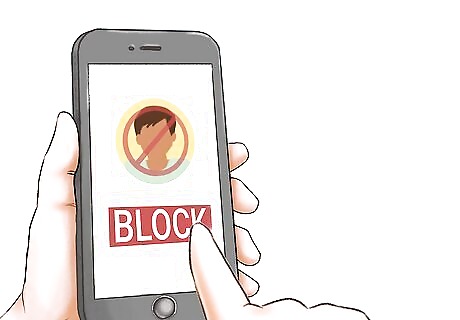
views
Setting Boundaries

Ask the caller to stop calling you so frequently. It’s possible that the caller is unaware that they are bothering you by calling you every day or multiple times a day. Tell them honestly that you would prefer they don’t call you so often. If this is someone you would like to continue to talk to, just not so frequently, be prepared to reassure the person that you still like them and would like to talk to them regularly. You could say, “Susie, I really value your friendship, but you’re calling me way too frequently. It’s not that I don’t enjoy talking to you. I just have a lot of other things going on and don’t have time to talk to you every day.”

Tell the caller how you are being affected by their frequent calling. Depending on the frequency and timing of the calls, you may be experiencing an increase in stress, a loss of focus, or even poor sleeping patterns. All of these things can have a negative impact on your life. Express this to the caller without judgement or blame. They may be unaware of the impact their constant calling is having on you and hearing your perspective can help clear things up.

Set boundaries for calls. Establish healthy boundaries with clear communication. Tell the caller that you care about them and enjoy talking to them, but too many frequent calls cut into other demands on your schedule, such as time at work and with family and other friends. Be clear about how many calls per day or week you find acceptable and what times should be off-limit. You may decide, for example, that you cannot answer calls during your work shift or after your bedtime. Tell the caller, “If you call me while I’m at work, between the hours of 9 a.m. and 5 p.m., I will not be able to answer the phone. I go to bed at 10 p.m., so please do not call me past that time unless it’s a life-or-death emergency.” Stick to the boundaries that you set. If you constantly make exceptions to the rules you’ve set, the caller will quickly learn that the boundaries are meaningless and will not respect your rules.

Stick to your boundaries. Only deviate from your set boundaries in cases of emergency, such as when the person’s car breaks down and they are stranded on the highway or if there is a medical emergency with them or someone they are close to. If the person continues to call for non-emergency situations, simply answer the phone and promptly say, “I’m at work right now and can’t talk on the phone. I will call you back once I get home around 6 p.m.” and then hang up. Don’t tell someone you will call them back if you have no intention of calling them back. This will only create heightened anticipation and anxiety at not hearing from you. Such anxiety may actually increase the amount that the person calls.

Set a schedule. Schedule a regular time that works best for both of you to have a check-in call. This may be once a week or multiple times a week depending on what works best for your situation. Even though this may seem too formal, having a set schedule can relieve a lot of anxiety for someone who is clingy, insecure, or worried about you. Furthermore, it will let the person know that you are willing to make time for them because you value your relationship with them, while also making it clear that there is a limit to the amount of time you can give them.
Ignoring Calls

Send their calls to voicemail. If after taking the above steps you don’t see improvements in the frequency of this person’s calls or if they ignore your request to respect your boundaries, then simply ignore the calls by not answering the phone. Ultimately, you have to do what is best for you to manage your life and minimize your stress. Return the phone calls on your own schedule or do not return them at all if you feel like this relationship is toxic and not worth saving.

Tell the person you will not answer their phone calls. If the calls persist despite asking the caller to stop calling so frequently, tell them honestly that you will no longer answer their calls. Some people may not get the message that you are ignoring their calls, and some will call even more frequently if they are unsure why their calls are going unanswered. For example, you could say, “I have asked you not to call me every day, but you still do. Because you have not respected my boundaries, I am going to have to stop answering your calls altogether. If I have time to speak with you, I will call you back when it’s convenient for me.” If you never want to speak to the person again, tell them that. For example, “I have asked you repeatedly to stop calling me. I do not want to speak to you. I will not answer the phone when you call ever again.”

Block the caller’s number from your phone. If the person continues to call and the frequency becomes abusive, you may want to block the number from your phone to have the calls go straight to voicemail or screen your calls by using caller ID and refusing to answer. If they persist in trying to contact you by other means, this person may be stalking you and you should notify the police.
Distancing Yourself

Ask the caller if they are worried or stressed about something. People can often be clingy if they are insecure in their relationship with you or even if they are worried about something going on in their life. Take some time to have a heart-to-heart conversation with the caller to determine if there is a deeper problem that is causing them to reach out to you so often. If you live in the same city, it may be easier to have this conversation face-to-face rather than over the phone. If the caller is feeling insecure about their relationship with you, assure them of your relationship’s stability by telling them how important they are to you. You might say, “You are one of my closest friends. I can’t imagine my life without you in it.” It may be possible that the caller is experiencing some mental health problems and is reaching out to you for help. If you sense that they are exhibiting signs of anxiety, depression, PTSD, or other mental health issues, you may need to spend more time supporting them or assist them in seeking professional help.

Find a new crowd. If you see the caller frequently in your everyday life, try finding new people to spend time with. Spending less time with a person who is clingy can help signal to them that you have a life outside of your relationship with them. Like the old adage, “Out of sight, out of mind,” the person may be less inclined to call you if they don’t see you so often and you are not on their mind so much.

Encourage the caller to explore new interests. This person may be calling you too frequently because they are bored or have little going on in their lives besides their relationship with you. Suggest that they pursue activities related to their interests by joining a team or a hobby club, taking educational classes, or participating in volunteer opportunities.

















Comments
0 comment